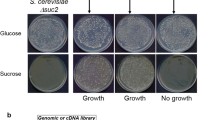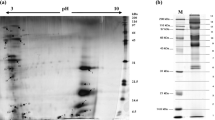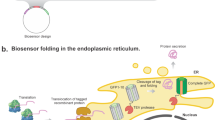Abstract
Optimizing appropriate signal peptides in mammalian cell-based protein production is crucial given that most recombinant proteins produced in mammalian cells are thought to be secreted proteins. Until now, most studies on signal peptide in mammalian cells have replaced native signal peptides with well-known heterologous signal peptides and bioinformatics-based signal peptides. In the present study, we successfully established an in vitro screening system for synthetic signal peptide in CHO cells by combining a degenerate codon-based oligonucleotides library, a site-specific integration system, and a FACS-based antibody detection assay. Three new signal peptides were screened using this new screening system, confirming to have structural properties as signal peptides by the SignalP web server, a neural network-based algorithm that quantifies the signal peptide-ness of amino acid sequences. The novel signal peptides selected in this study increased Fc-fusion protein production in CHO cells by increasing specific protein productivity, whereas they did not negatively affect cell growth. Particularly, the SP-#149 clone showed the highest qp, 0.73 ± 0.01 pg/cell/day from day 1 to day 4, representing a 1.47-fold increase over the native signal peptide in a serum-free suspension culture mode. In addition, replacing native signal peptide with the novel signal peptides did not significantly affect sialylated N-glycan formation, N-terminal cleavage pattern, and biological function of Fc-fusion protein produced in CHO cells. The overall results indicate the utility of a novel in vitro screening system for synthetic signal peptide for mammalian cell-based protein production.
Key points
• An in vitro screening system for synthetic signal peptide in mammalian cells was established
• This system combined a degenerate codon-based library, site-specific integration, and a FACS-based detection assay
• The novel signal peptides selected in this study could increase Fc-fusion protein production in mammalian cells








Similar content being viewed by others
Data availability
The data that support the findings of this study are available on request from the corresponding author. The mass spectrometry proteomics data have been deposited to the ProteomeXchange Consortium via the PRIDE (Perez-Riverol et al. 2022) partner repository with the dataset identifier PXD033441.
References
Aldrich TL, Viaje A, Morris AE (2003) EASE vectors for rapid stable expression of recombinant antibodies. Biotechnol Prog 19(5):1433–1438. https://doi.org/10.1021/bp034056j
Attallah C, Etcheverrigaray M, Kratje R, Oggero M (2017) A highly efficient modified human serum albumin signal peptide to secrete proteins in cells derived from different mammalian species. Protein Expr Purif 132:27–33. https://doi.org/10.1016/j.pep.2017.01.003
Brezinsky SCG, Chiang GG, Szilvasi A, Mohan S, Shapiro RI, MacLean A, Thill GJ (2003) A simple method for enriching populations of transfected CHO cells for cells of higher specific productivity. J Immunol Methods 277(1–2):141–155. https://doi.org/10.1016/s0022-1759(03)00108-x
Brown AJ, Gibson SJ, Hatton D, Arnall CL, James DC (2019) Whole synthetic pathway engineering of recombinant protein production. Biotechnol Bioeng 116(2):375–387. https://doi.org/10.1002/bit.26855
Castiñeiras TS, Williams SG, Hitchcock A, Cole JA, Smith DC, Overton TW (2018) Development of a generic β-lactamase screening system for improved signal peptides for periplasmic targeting of recombinant proteins in Escherichia coli. Sci Rep 8(1):1–18. https://doi.org/10.1038/s41598-018-25192-3
Chakrabarti L, Zhuang L, Roy G, Bowen MA, Dall’Acqua WF, Hawley-Nelson P, Marelli M (2019) Amber suppression coupled with inducible surface display identifies cells with high recombinant protein productivity. Biotechnol Bioeng 116(4):793–804. https://doi.org/10.1002/bit.26892
Chen W, Zhao X, Zhang M, Yuan Y, Ge L, Tang B, Xu X, Cao L, Guo H (2016) High-efficiency secretory expression of human neutrophil gelatinase-associated lipocalin from mammalian cell lines with human serum albumin signal peptide. Protein Expr Purif 118:105–112. https://doi.org/10.1016/j.pep.2015.10.012
Chin CL, Goh JB, Srinivasan H, Liu KI, Gowher A, Shanmugam R, Lim HL, Choo M, Tang WQ, Tan AHM, Nguyen-Khuong T, Tan MH, Ng SK (2019) A human expression system based on HEK293 for the stable production of recombinant erythropoietin. Sci Rep 9(1):1–16. https://doi.org/10.1038/s41598-019-53391-z
Florin L, Pegel A, Becker E, Hausser A, Olayioye MA, Kaufmann H (2009) Heterologous expression of the lipid transfer protein CERT increases therapeutic protein productivity of mammalian cells. J Biotechnol 141:84–90. https://doi.org/10.1016/j.jbiotec.2009.02.014
Gibson SJ, Bond NJ, Milne S, Lewis A, Sheriff A, Pettman G, Pradhan R, Higazi DR, Hatton D (2017) N-terminal or signal peptide sequence engineering prevents truncation of human monoclonal antibody light chains. Biotechnol Bioeng 114(9):1970–1977. https://doi.org/10.1002/bit.26301
Güler-Gane G, Kidd S, Sridharan S, Vaughan TJ, Wilkinson TC, Tigue NJ (2016) Overcoming the refractory expression of secreted recombinant proteins in mammalian cells through modification of the signal peptide and adjacent amino acids. PLoS ONE 11(5):e0155340. https://doi.org/10.1371/journal.pone.0155340
Hamaker NK, Lee KH (2018) Site-specific integration ushers in a new era of precise CHO cell line engineering. Curr Opin Chem Eng 22:152–160. https://doi.org/10.1016/j.coche.2018.09.011
Hansen HG, Pristovšek N, Kildegaard HF, Lee GM (2017) Improving the secretory capacity of Chinese hamster ovary cells by ectopic expression of effector genes: Lessons learned and future directions. Biotechnol Adv 35(1):64–76. https://doi.org/10.1016/j.biotechadv.2016.11.008
Haryadi R, Ho S, Kok YJ, Pu HX, Zheng L, Pereira NA, Li B, Bi X, Goh LT, Yang T, Song Z (2015) Optimization of heavy chain and light chain signal peptides for high level expression of therapeutic antibodies in CHO cells. PLoS ONE 10(2):e0116878. https://doi.org/10.1371/journal.pone.0116878
Kapp K, Schrempf S, Lemberg MK, Dobberstein B (2009) Post-targeting functions of signal peptides. In: Zimmermann R (ed) Protein transport into the endoplasmic reticulum. Landes Bioscience, Austin, pp 2000–2013
Kim JY, Kim YG, Lee GM (2012) CHO cells in biotechnology for production of recombinant proteins: current and further potential. Appl Microbiol Biotechnol 93(3):917–930. https://doi.org/10.1007/s00253-011-3758-5
Kim SH, Baek M, Park S, Shin S, Lee JS, Lee GM (2022) Improving the secretory capacity of CHO producer cells: the effect of controlled Blimp1 expression, a master transcription factor for plasma cells. Metab Eng 69:73–86. https://doi.org/10.1016/j.ymben.2021.11.001
Kober L, Zehe C, Bode J (2013) Optimized signal peptides for the development of high expressing CHO cell lines. Biotechnol Bioeng 110(4):1164–1173. https://doi.org/10.1002/bit.24776
Kulmala A, Huovinen T, Lamminmäki U (2019) Improvement of Fab expression by screening combinatorial synonymous signal sequence libraries. Microb Cell Fact 18(1):157. https://doi.org/10.1186/s12934-019-1210-1
Lang S, Drewello D, Wichter J, Nommay A, Wilms B, Knopf HP, Jostock T (2016) Surface display vectors for selective detection and isolation of high level antibody producing cells. Biotechnol Bioeng 113(11):2386–2393. https://doi.org/10.1002/bit.26000
Le Fourn V, Girod PA, Buceta M, Regamey A, Mermod N (2014) CHO cell engineering to prevent polypeptide aggregation and improve therapeutic protein secretion. Metab Eng 21(21):91–102. https://doi.org/10.1016/j.ymben.2012.12.003
Lee JH, Jeong YR, Kim YG, Lee GM (2017) Understanding of decreased sialylation of Fc-fusion protein in hyperosmotic recombinant Chinese hamster ovary cell culture: N-glycosylation gene expression and N-linked glycan antennary profile. Biotechnol Bioeng 114(8):1721–1732. https://doi.org/10.1002/bit.26284
Lee JS, Kildegaard HF, Lewis NE, Lee GM (2019) Mitigating clonal variation in recombinant mammalian cell lines. Trends Biotechnol 37(9):931–942. https://doi.org/10.1016/j.tibtech.2019.02.007
Li C, Li W, Lucio de Esesarte E, Guo H, van den Elzen P, Aarts E, van den Born E, Rottier PJM, Bosch BJ (2017) Cell attachment domains of the porcine epidemic diarrhea virus spike protein are key targets of neutralizing antibodies. J Virol 91(12):e00273-e317. https://doi.org/10.1128/JVI.00273-17
Mullin MJ, Wilkinson C, Hiles I, Smith KJ (2021) Improved secretion of recombinant human IL-25 in HEK293 cells using a signal peptide-pro-peptide domain derived from Trypsin-1. Biotechnol Lett 43(4):757–765. https://doi.org/10.1007/s10529-020-03072-z
Nielsen H, Tsirigos KD, Brunak S, von Heijne G (2019) A brief history of protein sorting prediction. Protein J 38(3):200–216. https://doi.org/10.1007/s10930-019-09838-3
Nov Y (2012) When second best is good enough: another probabilistic look at saturation mutagenesis. Appl Environ Microbiol 78(1):258–262. https://doi.org/10.1128/AEM.06265-11
Owji H, Nezafat N, Negahdaripour M, Hajiebrahimi A, Ghasemi Y (2018) A comprehensive review of signal peptides: Structure, roles, and applications. Eur J Cell Biol 97(6):422–441. https://doi.org/10.1016/j.ejcb.2018.06.003
Peng RW, Fussenegger M (2009) Molecular engineering of exocytic vesicle traffic enhances the productivity of Chinese hamster ovary cells. Biotechnol Bioeng 102:1170–1181. https://doi.org/10.1002/bit.22141
Peng RW, Abellan E, Fussenegger M (2011) Differential effect of exocytic SNAREs on the production of recombinant proteins in mammalian cells. Biotechnol Bioeng 108:611–620. https://doi.org/10.1002/bit.22986
Peng L, Yu X, Li C, Cai Y, Chen Y, He Y, Yang J, Jin J, Li H (2016) Enhanced recombinant factor VII expression in Chinese hamster ovary cells by optimizing signal peptides and fed-batch medium. Bioengineered 7(3):189–197. https://doi.org/10.1080/21655979.2016.1176656
Perez-Riverol Y, Bai J, Bandla C, García-Seisdedos D, Hewapathirana S, Kamatchinathan S, Kundu DJ, Prakash A, Frericks-Zipper A, Eisenacher M, Walzer M, Wang S, Brazma A, Vizcaíno JA (2022) The PRIDE database resources in 2022: a hub for mass spectrometry-based proteomics evidences. Nucleic Acids Res 50(D1):D543–D552. https://doi.org/10.1093/nar/gkab1038
Petersen TN, Brunak S, Von Heigne G, Nielsen H (2011) SignalP 4.0: discriminating signal peptides from transmembrane regions. Nat Methods 8(10):785–786. https://doi.org/10.1038/nmeth.1701
Pichler J, Hesse F, Wieser M, Kunert R, Galosy SS, Mott JM, Borth N (2009) A study on the temperature dependency and time course of the cold capture antibody secretion assay. J Biotechnol 141(1–2):80–83. https://doi.org/10.1016/j.jbiotec.2009.03.001
Rakestraw JA, Sazinsky SL, Piatesi A, Antipov E, Wittrup KD (2009) Directed evolution of a secretory leader for the improved expression of heterologous proteins and full-length antibodies in Saccharomyces cerevisiae. Biotechnol Bioeng 103(6):1192–1201. https://doi.org/10.1002/bit.22338
Ramezani A, Maymand EM, Yazdanpanah-Samani M, Hosseini A, Toghraie FS, Ghaderi A (2017) Improving Pertuzumab production by gene optimization and proper signal peptide selection. Protein Expr Purif 135:24–32. https://doi.org/10.1016/j.pep.2017.04.013
Romanova N, Noll T (2018) Engineered and natural promoters and chromatin-modifying elements for recombinant protein expression in CHO cells. Biotechnol J 13(3):e1700232. https://doi.org/10.1002/biot.201700232
You M, Yang Y, Zhong C, Chen F, Wang X, Jia T, Chen Y, Zhou B, Mi Q, Zhao Q, An Z, Luo W, Xia N (2018) Efficient mAb production in CHO cells with optimized signal peptide, codon, and UTR. Appl Microbiol Biotechnol 102(14):5953–5964. https://doi.org/10.1007/s00253-018-8986-5
Funding
This work was supported by the National Research Foundation of Korea (NRF) grant funded by the Korea government (MEST) (No. NRF-2020R1A2C4001982) and the Establishment of Technology Commercialization Collaboration Platform through Korea Innovation Foundation funded by the Ministry of Science and ICT (Project name: Establishing Project on the Collaboration Platform of the Technology-Commercialization for Biomedical-Industry in INNOPOLIS Daedeok/Project number: 2021-DD-RD-0012).
Author information
Authors and Affiliations
Contributions
JHP, GML, and YGK designed the research. GML and YGK supervised the project. JHP, HML, and EJJ conducted the main experiments for signal peptide screening. EJL and YJK contributed to the protein purification and protein quality analyses. SK and SSY contributed to the construction of the expression vector and protein activity assays. JHP, GML, and YGK wrote the manuscript. All authors read and approved the manuscript.
Corresponding authors
Ethics declarations
Ethic approval
This article does not contain any studies with human participants or animals performed by any of the authors.
Conflict of interest
The authors declare no competing interests.
Additional information
Publisher’s note
Springer Nature remains neutral with regard to jurisdictional claims in published maps and institutional affiliations.
Supplementary Information
Below is the link to the electronic supplementary material.
Rights and permissions
About this article
Cite this article
Park, JH., Lee, HM., Jin, EJ. et al. Development of an in vitro screening system for synthetic signal peptide in mammalian cell-based protein production. Appl Microbiol Biotechnol 106, 3571–3582 (2022). https://doi.org/10.1007/s00253-022-11955-6
Received:
Revised:
Accepted:
Published:
Issue Date:
DOI: https://doi.org/10.1007/s00253-022-11955-6




